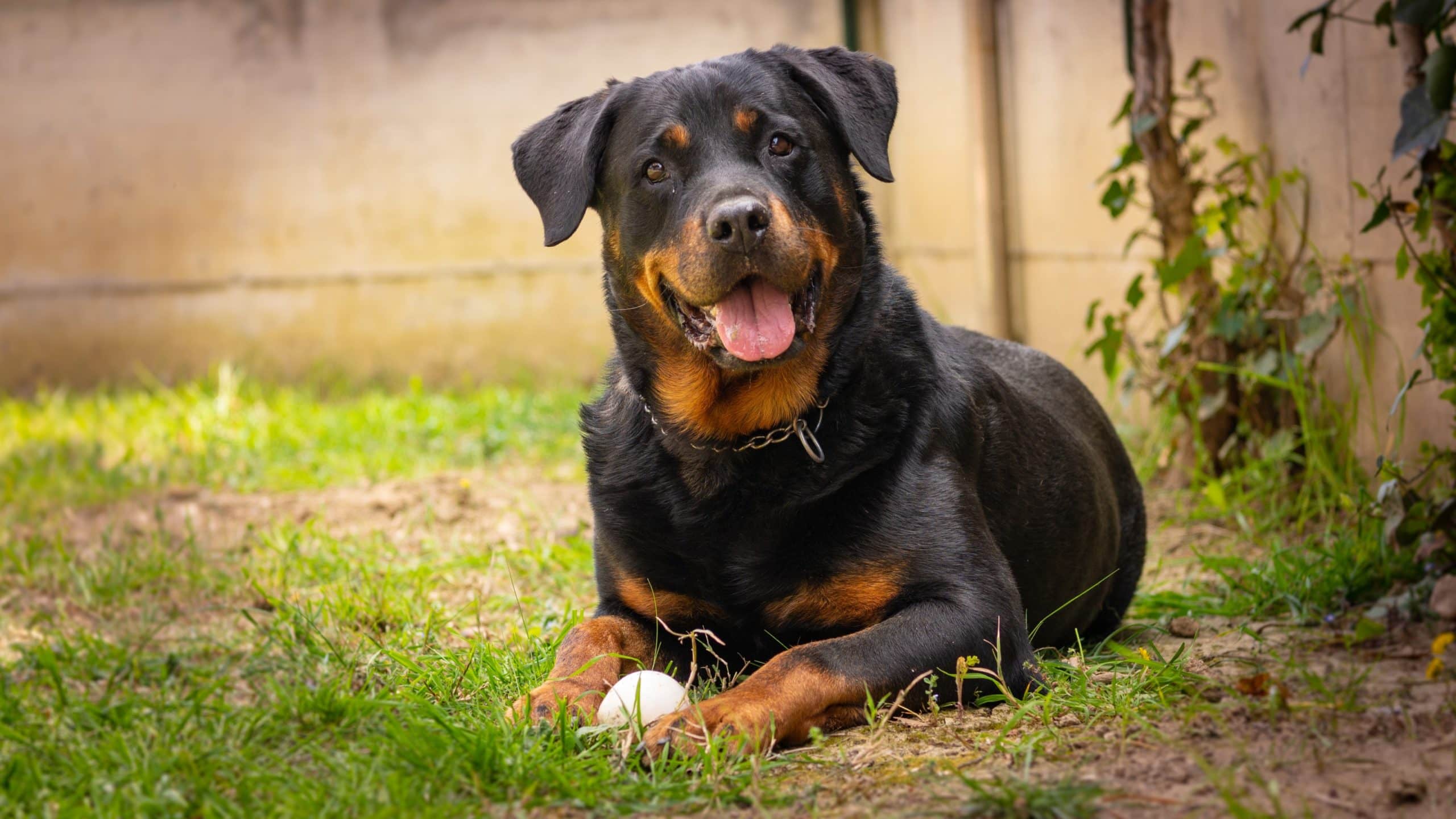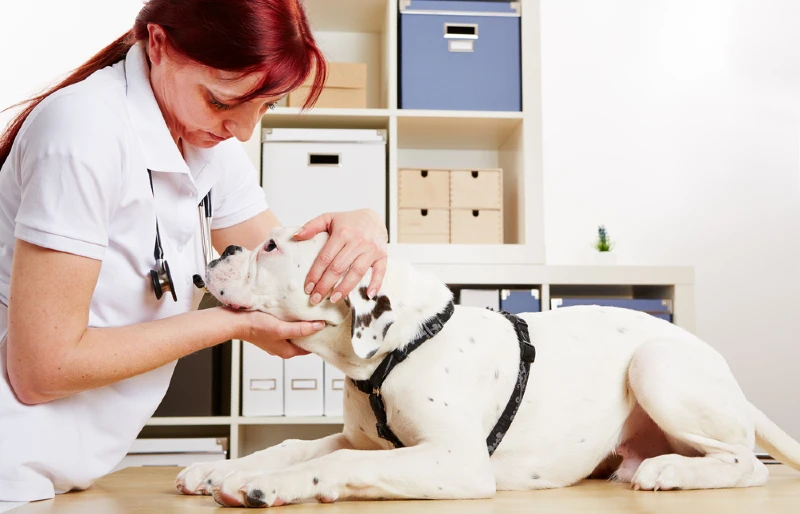
Dogs, like their human counterparts, can be subjected to the occasional bout of hiccups. Most of the time, dog hiccups are perfectly normal and will resolve themselves within a few minutes. Hiccups tend to be more common in puppies and young dogs and are rarely a cause for concern. But why do dogs get hiccups? What causes them? And when should you be concerned that your dog is hiccupping? Hiccups in dogs and puppies are caused by a rapid contraction of the diaphragm.
What Are Dog Hiccups?
The diaphragm is a sheet of muscle that separates the chest from the abdomen and is involved in helping your pup to breathe. When a dog breathes in, the diaphragm contracts and moves down, increasing space in the chest cavity for the lungs to fill with air. When a dog breathes out, the diaphragm relaxes and makes the chest cavity smaller, squeezing the air out of the lungs.
The movement of the diaphragm is smooth and rhythmical. However, when it contracts suddenly or irregularly, the result is a small spasm of the muscle and the resulting hiccup. The muscle of the diaphragm is controlled by several nerves, one of which is called the phrenic nerve. This nerve lies very superficially in the diaphragm and can be irritated by movements of the stomach and intestines that sit nearby. This is particularly true if the stomach is filled with gas or air.
Hiccups can be singular or occur in quick succession if the contraction of the diaphragm is repeated. Most hiccups in dogs are silent, and we mainly see their belly and chest moving quickly. However, if air is expelled through the glottis or vocal cords at the same time, a small “hic” sound or cough may be noticed.
Why Do Dogs Get Hiccups?

A hiccup occurs when the diaphragm is irritated, causing a short, involuntary spasm of the muscle. The most common reason for this in dogs is drinking or eating too fast, causing your dog to ingest air along with their food or water. The air and food mix in your dog’s stomach, causing it to expand with gas and irritate the diaphragm as the stomach contracts and moves to digest the food. Excitement, stress, or panting can also cause a bout of hiccups.
Puppies are more likely to get hiccups than older dogs. Puppies often eat faster than adult dogs and are more playful and energetic, causing them to ingest more air. This build-up of gas inside the stomach can irritate the diaphragm. Young dogs also have less fat inside their abdomen and therefore less padding around the stomach to absorb some of its movements. Puppies naturally breathe faster than adult dogs and their muscles are weaker and tire more easily, making contractions of the diaphragm and resulting hiccups more likely.
Do Hiccups Hurt Dogs?
Hiccups are unlikely to cause any pain or discomfort to your dog. Most bouts of hiccups resolve themselves within a few minutes and are little more than an annoyance to your dog. Most dogs will remain calm during bouts of hiccups and not show signs of distress or discomfort. If your dog is showing signs of distress such as excessive pacing, panting, or being unsettled, or abdominal discomfort such as stretching, turning to look at the abdomen, or pain on touching the abdomen, then it is advisable to seek veterinary attention.
The 3 Ways You Can Get Rid of Dog Hiccups
There are many suggestions as to how to get rid of hiccups in people, although it is unlikely that many of these will work for our canine companions. You can’t exactly ask your dog to hold his breath and count to 10! Scaring your dog is certainly not recommended. But what can we do that works?
1. Calm Irregular Breathing
Helping to slow down your dog’s breathing will slow the movement of the diaphragm and reduce its contractions. Encourage your dog to lie down and relax. Avoid exercise or excitement. Maybe offer them a tummy rub to encourage relaxation.
2. Drink Water
Drinking water will help reduce the gas in the stomach and allow the movements of the stomach to settle. Encourage your dog to drink calmly and slowly.

3. Slow Down Mealtimes
If your dog is prone to getting hiccups because they eat or drink too quickly, try to slow them down. Try scattering your dog’s food across the floor or using a slow feeding dish to avoid them gulping down their meal.
When Should You Worry About Dog Hiccups?

In rare cases, prolonged bouts of hiccups, or frequently recurring bouts of hiccups, could be a sign that something isn’t quite right.
It is advisable to seek veterinary attention as soon as possible if you see any of the following:
Your Dog Appears to Be In Pain or Is Distressed
Panting, pacing, stretching, or frequently turning round to look at their belly can be signs of abdominal pain.
Your Dog Is Drooling Excessively
This could be a sign of nausea, abdominal pain, or toxin ingestion.
Your Dog Is Struggling to Breathe With the Hiccups
Any change to your dog’s breathing pattern – for example, if it becomes more labored or is faster than normal – should be investigated further. Your dog tiring more easily or being unable to exercise when he has hiccups could also be a cause for concern.
Your Dog Starts to Vomit After Hiccupping
This could be a sign of a stomach upset or toxin ingestion.
Conclusion
Most bouts of hiccups in dogs and puppies don’t require any intervention. However, if you are concerned your pup is in discomfort, or hiccups are becoming a regular occurrence for your furry friend, then a trip to your veterinarian might be in order.
Related Reads:
- Why Does My Dog Breathe Fast While Sleeping: Is it Normal? (Vet Answer)
- Why Is My Puppy Breathing Fast: Should I Worry? Vet Answer)
Featured Image Credit: nicolas.fontana, Shutterstock







